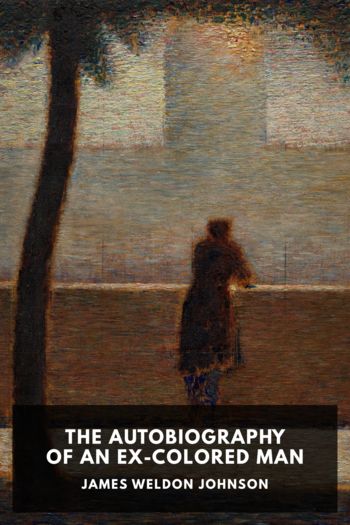The Autobiography of an Ex-Colored Man - James Weldon Johnson (best classic books of all time txt) 📗

- Author: James Weldon Johnson
Book online «The Autobiography of an Ex-Colored Man - James Weldon Johnson (best classic books of all time txt) 📗». Author James Weldon Johnson
The next morning I got out of the car at Jacksonville with a stiff and aching body. I determined to ask no more porters, not even my benefactor, about stopping-places; so I found myself on the street not knowing where to go. I walked along listlessly until I met a colored man who had the appearance of a preacher. I asked him if he could direct me to a respectable boardinghouse for colored people. He said that if I walked along with him in the direction he was going, he would show me such a place: I turned and walked at his side. He proved to be a minister, and asked me a great many direct questions about myself. I answered as many as I saw fit to answer; the others I evaded or ignored. At length we stopped in front of a frame house, and my guide informed me that it was the place. A woman was standing in the doorway, and he called to her saying that he had brought her a new boarder. I thanked him for his trouble, and after he had urged upon me to attend his church while I was in the city, he went on his way.
I went in and found the house neat and not uncomfortable. The parlor was furnished with cane-bottomed chairs, each of which was adorned with a white crocheted tidy. The mantel over the fireplace had a white crocheted cover; a marble-topped center table held a lamp, a photograph album and several trinkets, each of which was set upon a white crocheted mat. There was a cottage organ in a corner of the room, and I noted that the lamp-racks upon it were covered with white crocheted mats. There was a matting on the floor, but a white crocheted carpet would not have been out of keeping. I made arrangements with the landlady for my board and lodging; the amount was, I think, three dollars and a half a week. She was a rather fine-looking, stout, brown-skin woman of about forty years of age. Her husband was a light-colored Cuban, a man about one half her size, and one whose age could not be guessed from his appearance. He was small in size, but a handsome black mustache and typical Spanish eyes redeemed him from insignificance.
I was in time for breakfast, and at the table I had the opportunity to see my fellow boarders. There were eight or ten of them. Two, as I afterwards learned, were colored Americans. All of them were cigar makers and worked in one of the large factories—cigar making is one trade in which the color line is not drawn. The conversation was carried on entirely in Spanish, and my ignorance of the language subjected me more to alarm than embarrassment. I had never heard such uproarious conversation: everybody talked at once, loud exclamations, rolling “carambas,” menacing gesticulations with knives, forks, and spoons. I looked every moment for the clash of blows. One man was emphasizing his remarks by flourishing a cup in his hand, seemingly forgetful of the fact that it was nearly full of hot coffee. He ended by emptying it over what was, relatively, the only quiet man at the table excepting myself, bringing from him a volley of language which made the others appear dumb by comparison. I soon learned that in all of this clatter of voices and table utensils they were discussing purely ordinary affairs and arguing about mere trifles, and that not the least ill feeling was aroused. It was not long before I enjoyed the spirited chatter and badinage at the table as much as I did my meals—and the meals were not bad.
I spent the afternoon in looking around the town. The streets were sandy, but were well-shaded by fine oak trees, and far preferable to the clay roads of Atlanta. One or two public squares with green grass and trees gave the city a touch of freshness. That night after supper I spoke to my landlady and her husband about my intentions. They told me that the big winter hotels would not open within two months. It can easily be imagined what effect this news had on me. I spoke to them frankly about my financial condition and related the main fact of my misfortune in Atlanta. I modestly mentioned my ability to teach music and asked if there was any likelihood of my being able to get some scholars. My landlady suggested that I speak to the preacher who had shown me her house; she felt sure that through his influence I should be able to get up a class in piano. She added, however, that the colored people were poor, and that the general price for music lessons was only twenty-five cents. I noticed that the thought of my teaching white pupils did not even remotely enter her mind. None of this information made my prospects look much brighter.
The husband, who up to this time had allowed the woman to do most of the talking, gave me the first bit of tangible hope; he said that he could get me a job as a “stripper” in the factory where he worked, and that





Comments (0)